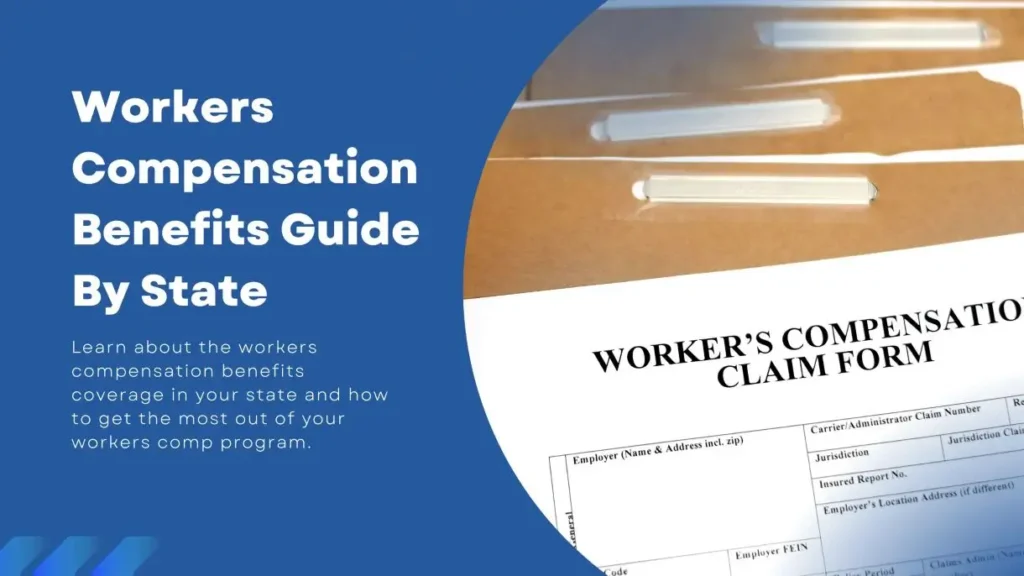Ever wondered how employee-friendly your state happens to be? You probably never gave it much thought — until you or someone you love got hurt or sick at work. Each state has its own rules and guidelines for workers compensation benefits, and they very widely.
Just as every claimant is unique, so too is each state’s individual rules. For example, states have different laws about which employers must carry workers’ comp insurance. Here’s what to know about your state and the workers compensation coverage they provide.
Ready to see if you may qualify? Click here to get a FREE, no-obligation consultation before starting your claim.
What Injuries Qualify for Workers Compensation?
If you’re hurt or become ill while engaged in work-related activities, you’re probably eligible for workers comp. According to the Bureau of Labor Statistics, the most common employer-reported accidents and illnesses are:
- Overexertion and bodily reaction
- Contact with objects and equipment
- Slips, trips and falls
- Exposure to harmful substances or environments
GOOD TO KNOW: Worker’s comp rules are different for people employed by the U.S. Government.
What Are My Employer’s Workers’ Comp and Leave Policies?
Some employers require you to see a doctor of their choosing for a work-related injury or illness. And failure to do so could jeopardize your claim. Check your employee handbook to see the specific procedure for initiating a claim and how workers comp leave is handled. When you’re out on workers comp, you may be covered by the federal Family and Medical Leave Act or a state-level provision like the California Family Rights Act.
Company Size Guidelines for Providing Workers Compensation Benefits by State
Accidents and injuries can happen at any kind of workplace, no matter how large or small. Most state laws say employers must have workers’ compensation insurance even if they only have one employee. There are some exceptions to this rule, however. For example, in Virginia, employers must have two or more employees before they have to buy coverage. Here’s a look at how many employees a company has to have before they need workers compensation insurance:
- Arkansas, Georgia, Michigan, New Mexico, North Carolina and Wisconsin: Employers that employ three or more people must buy coverage.
- Florida, Rhode Island and South Carolina: Workers’ comp coverage is a must with four or more employees.
- Alabama, Mississippi, Missouri and Tennessee: Coverage becomes mandatory for employers with five or more workers.
- New Jersey and Texas: No mandatory workers’ comp coverage laws exist. New Jersey’s laws say an employer must either obtain coverage or qualify to self-insure. In Texas, WC coverage is completely optional (though most employers do buy insurance that provides some workers compensation benefits).
Waiting Period Rules: How Long Before You’ll Get Paid Workers Compensation Benefits?
Each state’s workers compensation programs have a waiting period before you can start collecting Temporary Total Disability payments (TTD). This is called the “statutory waiting period.” (Each state’s law determines how long you’ll wait to receive workers compensation benefits.)
Because this waiting period exists everywhere, always file your workers’ comp claim right away after an accident. If realize you’re unable to perform work tasks due to a chronic condition, file your claim immediately.
Here are the different waiting periods for workers compensation — where does your state fall on this list?
- 3 days – Alabama, Alaska, California, Connecticut, Colorado, Delaware, Hawaii, Iowa, Illinois, Maryland, Minnesota, Missouri, New Hampshire, Oregon, Oklahoma, Rhode Island, Utah, Vermont, Washington, West Virginia, Wisconsin, Wyoming
- 4 days – Montana
- 5 days – Idaho, Massachusetts, Mississippi, Nevada, North Dakota
- 7 days – Arizona, Arkansas, Florida, Georgia, Indiana, Kansas, Kentucky, Louisiana, Maine, Michigan, Nebraska, New Jersey, New Mexico, New York, North Carolina, Ohio, Pennsylvania, South Carolina, South Dakota, Tennessee, Texas, Virginia
Percentage of Wages Paid in Benefits by State
Doing the math to figure out your workers’ compensation benefit payment can be difficult, and the payout will vary depending on the severity of your injury. Workers compensation insurance payments for Temporary Total Disability (TTD) are most often 66.67% of your pre-tax wages.
This guideline does have exceptions, however. It all depends on where you live. Alaska, Iowa, Maine and Michigan pay 80% of after-tax earnings to TTD-eligible claimants.
Here are some other exceptions to the 66.67% payment rule:
- Rhode Island pays 75% of your after-tax earnings.
- New Jersey, Oklahoma and West Virginia pay 70% of your pre-tax wages.
- Idaho pays 67%.
- Massachusetts as well as New Hampshire pay 60%.
- Wyoming pays 66.67% of your actual monthly wages.
- Texas pays 70% for workers who earn more than $8.50/hour. All others receive 75%.
- Ohio pays 72% for the first 12 weeks and 66.67% after 12 weeks.
- Washington pays 60–75%, depending on your marital status and number of dependents.
Limitations on Medical Workers Compensation Benefits by State
In 45 out of 50 states, there’s no limit to how much you can get in medical workers compensation coverage. This means it would be impossible for you to get denied medical care based on the dollar amount.
For the five states that limit medical benefits (which they call “maximums”), state laws differ:
- Ohio: Once you receive TTD benefits for 90 days, state law requires your doctor to perform a re-examination.
- Arkansas: State law says an employer isn’t responsible for medical costs after six months if your case meets any condition that’s listed below:
- You haven’t lost any more time from work.
- You’ve been back at work for six months.
- Your medical costs total at least $10,000.
- Florida and Montana: Employees owe a set co-pay amount for medical care.
- Tennessee: Your doctor must have a license to practice medicine in this state to prescribe or refer any psychological treatment. Otherwise, state law limits how much care you’ll get.
Maximum Length of Time You Can Get Workers Compensation Insurance Payouts by State
Thirty-four states provide benefits for the total time your disability stops you from working. However, 16 states do not. In Florida, Minnesota, Oklahoma, Texas, for example, workers’ comp TTD payments automatically end after 104 weeks. Montana doesn’t limit how long you can treat your workplace injury or illness. Still, state guidelines say you’re responsible for a co-payment.
Here are some other exceptions to that “no time limit” rule for getting workers compensation benefits:
- Massachusetts: 156 weeks
- West Virginia: 208 weeks
- Utah: 312 weeks
- Georgia, Missouri, New Jersey and Tennessee: 400 weeks
- Arkansas and Mississippi: 450 weeks
- Indiana, South Carolina and Virginia: 500 weeks
GOOD TO KNOW: State laws cap how much workers comp attorneys can charge you.
When Do I Need a Workers’ Comp Lawyer?
Deciding whether or not you need a workers compensation attorney is pretty straightforward.
Probably don’t need an attorney:
- Your workplace injury is minor and you’ll fully recover from it
- Your supervisor or boss witnessed the accident or onset
Probably should hire an attorney:
- Your employer retaliates and tries to fire you (wrongful termination)
- You have a pre-existing medical condition
- The doctors don’t agree on your diagnosis
- You’re permanently disabled
- Your injury involved a third party, including a coworker
- Your employers’ insurer denied your claim
- The settlement doesn’t cover your expenses or you’ll owe taxes you can’t afford
Get Workers Compensation Benefits For Your Workplace Injury or Illness
Believe your employer owes you more workers compensation payments than you’re getting? Then we strongly recommend talking to a lawyer. We can match you with a workers’ comp lawyer near you who can review your case confidentially for free. Always get a second opinion if you feel your employer fails to follow state workers’ comp laws!
Why take time out of your busy day to figure this out now? You don’t want to be trying to understand the workers compensation process while recovering from a work-related illness or injury. Getting up to speed on the basics now will lower the learning curve when you need to file a claim.
Let us connect you with a nearby workers comp attorney to discuss your claim free of charge.
Ready to see if you may qualify? Click here to get a FREE, no-obligation consultation before starting your claim.

